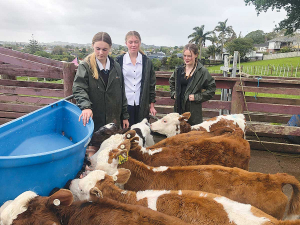New scholarship to grow female leaders in dairy
A new $50,000 scholarship fund designed to support and empower women in the New Zealand dairy industry through leadership development has been launched.
 Mt Albert Grammar student Rose Young (on right) with Kaitlyn Sanders and Pippi Butterworth, attend to the job of feeding the calves at ASB MAGS Farm.
Mt Albert Grammar student Rose Young (on right) with Kaitlyn Sanders and Pippi Butterworth, attend to the job of feeding the calves at ASB MAGS Farm.
Livestock grazing on a farm with a good view of Auckland’s Sky Tower is the story behind the latest Dairy Women’s Network visual story telling project Our People, Their Stories.
Mt Albert Grammar (MAGS) student Rose Young says she knows she is not quite a typical Auckland city teenager.
“It’s central Auckland, which is a bit crazy for me to be into agriculture I guess,” she told Dairy News, referring to the ASB MAGS 8.1ha working farm.
“But when I’m here I don’t feel like I’m at school. I feel like even though I’m learning so much while I’m doing it, it’s more or less just something I’d love to do anyway.”
The farm was set up in 1932, when the Auckland Horticultural Society decided that city children were losing knowledge of farming practices and asked Mount Albert Grammar to teach agriculture and horticulture.
The Auckland Savings Bank became involved, and special legislation was passed to allow the bank to buy land from the neighbouring Kerr-Taylor sisters’ farm and lease it back to the school at a peppercorn rental.
Out of its multicultural roll of over 3000 it now educates over 200 students annually from years 10-13 in agricultural and horticultural science, with these urban kids getting a unique opportunity to experience rural farm life without leaving the city.
ASB MAGS farm experience centre development manager Peter Brice says the farm is all about connecting kids with opportunities at the heart of New Zealand’s national identity -- the agri-food and fibre sector.
“It’s about milking dairy cows, shearing sheep, pruning vines, whatever it might be,” he said. “It’s pretty special, 8ha in the middle of Auckland with 260 agri, hort and agribusiness kids, which we’ve grown from 180 18 months ago.”
ASB MAGS farm advisory group chair Mark Heer says the farm connects and engages with city school students who would not normally be exposed to a rural environment.
“A strength of the Dairy Women’s Network is engagement and connection, which aligns well with the goal of the ASB MAGS Farm to engage and connect the agri food and fibre industries with urban school students,” he said.
Heer adds that it’s all about creating more awareness and understanding about rural farm life and taking that to greater New Zealand.
Young says there are days when she’s in school with her friends and looks out the window and spots Brice working on the farm and they contemplate writing a sign saying ‘get us out Peter, let us help you’.
“It’s very different from what I’m used to, or what anyone in Auckland is used to,” she said. “It’s great to get outside and for girls it is really cool and especially because we have such great female teachers who get us into it as well.”
In 2013, a new lease agreement was signed between ASB and the Mount Albert Grammar School board of trustees whereby the bank leases the land to the school for a 99 year term at a nominal annual rent of $1.
There are plans to build a new agri food and fibre experience centre which Brice says could be a central hub for agribusiness in Auckland.
Dairy Women’s Network chief executive Jules Benton says it has been a wonderful experience getting into heartland New Zealand to meet fantastic people and tell their amazing stories.
“It has been truly special,” she said. “The first two stories have been well received and we know this one will be too as it’s quite different from the first two.”
For Young, who has set her sights on a career in agriculture after leaving school, the farm makes going to school much more motivating. “It’s our little slice of New Zealand right in the city which is awesome to have.”
Registrations are now open for the 2026 Ruralco Golf Classic, with all proceeds from the event set to support the Mid Canterbury Rural Support Trust.
Mating wrapped up last month at the across-breed Beef Progeny Test on Pāmu’s Kepler Farm in Manapouri.
Libby Judson is a keeper of memories from an age gone by. Tim Fulton tells her story.
A New Zealand-first native tree study has highlighted the Bioeconomy Science Institute's position as a forestry research leader.
Hemp fibre processor Rubisco is relocating its core processing facility to Ashburton as part of a $20-$30 million expansion to leverage what it says is an accelerating global demand for sustainable and renewable fibres.
Tradition meets some of the latest in technology at the 2026 East Coast Farming Expo.